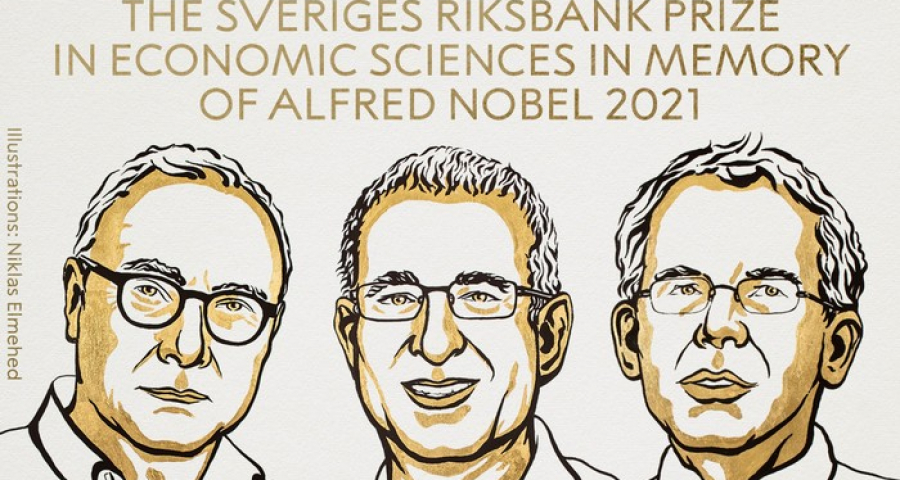What have Joshua Angrist, David Card and Guido Imbens, Nobel Laureates in Economics 2021, been engaged in studying? Tommaso Reggiani explains it to us, in simple terms
by Tommaso Reggiani *
The 2021 Nobel Prize for Economics has been awarded to Joshua Angrist, David Card and Guido Imbens, names that are not very well known to the general public, especially in Europe.
I had the good fortune to meet them virtually/poetically (it was 2008, Zoom was not yet around, everything was still done via books) for the first time during my first PhD class, thanks to Andrea Ichino's course (if you want a taste, you can find it here).
It was a fundamental course (indeed, THE course) in 'causality', where statistical methods applied to economics are studied (the so-called econometrics; anyone who has studied in an economics faculty has made the sign of the Cross at least once after hearing it mentioned) in order to rigorously identify causal links and their effects - for instance the effect on employment levels generated by the increase of the minimum hourly wage for workers - in all those situations where a real experiment is not 'politically' conceivable: can you imagine the enthusiasm of trade unions and Confindustria at the idea of derogating from the national collective agreement and introducing changes in Emilia-Romagna but not in Tuscany (two quite similar and comparable regions) for a period of 2 years in order to observe the effects generated by such changes within the labour market?
Card and Krueger (who, sadly, passed away prematurely in 2019), adopting the methodological approach developed and systematised by Angrist and Imbens, in a very creative way, exploited the institutional discontinuities between two comparable US states such as New Jersey and Pennsylvania, and measured the effects produced by the increase of the minimum wage on employment considering not only the (first) difference between employment levels in New Jersey before and after the minimum wage increase but also the (second) difference between the general employment dynamics in New Jersey and Pennsylvania. The first difference alone could in fact have imputed to the change in the wage effects actually generated by third phenomena (such as the macroeconomic situation, changes in market trends, etc.) that are not attributable to the minimum wage. To the extent that these third-party phenomena are similar in Pennsylvania and New Jersey, the second difference is able to "filter" them out, allowing us to identify the "net" effects generated by the increase in the minimum wage in New Jersey. In this study Card and Krueger observed that the minimum wage stimulated employment, in contrast to the prevailing theory which suggested a depressive effect of the minimum wage.
What can we learn from this Nobel Prize?
In Italy we are lucky to have many excellent students of our three protagonists. Involving them seriously and systematically in the political and institutional debate would be a real asset for everyone. Most of the time, the biggest obstacle is the scarce availability of data at the individual level. This is an indispensable raw material for conducting this type of study. The scarcity is sometimes caused by a lack of tout-court data, and many other times by mere bureaucratic barriers and administrative rigidities that prevent researchers from accessing and using them. Tito Boeri, a great friend of our three heroes, during his time as director of the INPS (National Social Security Institute) fought significantly against the removal of such barriers.
The second lesson. Nobody is perfect, not even the Nobel Prize winners. My dear friend Simon Jäger (make a note of his name, he'll be a Nobel Prize winner around 2055 for his empirical analysis of German "Mitbestimmung" - the system of active participation of workers in corporate decision-making processes) is Joshua Angrist's office neighbour at MIT in Boston. On weekends they go out cycling together. This is all very nice. The problem is that Joshua seems to be a fan of downhill biking, i.e. riding an (electric) bike mostly downhill, and sometimes even going up hills where even cable cars run - the fact that you risk your life with this practice doesn’t seem to be of primary importance... For a humble disciple like me of Marco Pantani and Gianni Mura, poets of uphill walks, this, however, is a bit hard to swallow.
* Tommaso Reggiani is a researcher in Economics at Cardiff University (UK).








